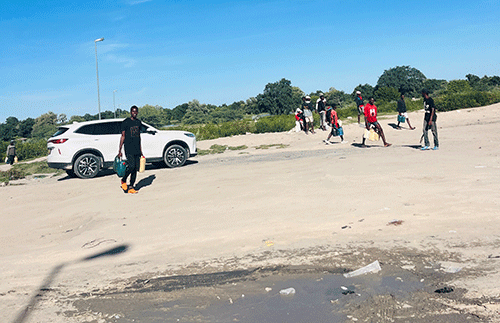OSHIKANGO – The rising water levels of rivers dividing Angola and Namibia as well as floods have brought life to a halt in some parts in the north, but fuel smugglers remain unshaken in their resolve to continue.
Sources revealed that Angolan nationals involved in smuggling fuel into Namibia risk their lives by crossing flooded rivers with 25-litre fuel containers to sell fuel in Oshikango.
Speaking to New Era yesterday, some of the smugglers stated that they often hide in the nearby flooded rivers whenever they see police officers approaching.
“The police don’t enter the water. Once we get into the river, they turn back. We then return to continue with our business,” said one of the illegal fuel traders.
He added that in some ways, the floods have been beneficial to their operations.
“This season, business is better than before. We get more customers daily. Our most reliable customers are taxi drivers. They give us the motivation to keep going,” he said.
This business is known as ‘Ngungula’.
Ngungula is the colloquial name for fuel smuggled from Angola, where it is more affordable than that sold in Namibian service stations.
The term is derived from the word ‘okungungula’, which is an Oshiwambo term for trotting or running steadily.
A five-litre container of petrol or diesel is sold at N$70, while a 25-litre container goes for as little as N$340.
Homesteads around Oshikango have turned into service stations, while some people drive from nearby regions to buy bottles of fuel and resell them.
Another smuggler said the area where they previously used to hide from police is now flooded, making it harder for authorities to confiscate their fuel.
“It’s very difficult to bring fuel into Namibia. Imagine crossing a whole river just to reach Oshikango. But we have no choice. We are trying to survive and fight hunger,” he continued.
Despite ongoing efforts by police to stop the illegal fuel trade, the situation remains hard to control, as the number of Angolan fuel sellers increases daily.
“In Oshikango, you will often see Angolans being chased by police, but they continue their business regardless,” another fuel smuggler said.
Some smugglers claim that they take advantage of what they perceive as leniency by the Namibian Police Force, as there have been no reports of injuries during these encounters. Already, four fuel service stations in the Ohangwena region have reportedly closed due to competition from illegal fuel sold at Angungula, a popular informal trading point. Some traders said floods have especially affected younger boys, who are unable to cross the deep waters to sell fuel.
“Only we, the older ones, can cross the river in these conditions,” one man said.
Speaking to this publication, Ohangwena police spokesperson Andreas Nghiyolwa confirmed that Oshikango is currently surrounded by water flowing from Angola. “It’s a big challenge for police to enter the water. It’s unsafe because there are deep holes, and there’s a risk of falling in,” he said.
He stressed that the police would continue efforts to curb illegal activities and ensure public safety at the border. He said the fuel smugglers at Oshikango have become aggressive towards the Namibian law-enforcement officers whenever they are confronted during police operations at the borders.
“They want to fight the officers, and this has now become regular,” he added.
Nghiyolwa noted that journalists taking photos and videos at the border are sometimes likewise threatened by Angolans involved in fuel smuggling.
“Fuel smugglers, armed with knives and pangas, now threaten to attack Namibian Police officers stationed along the Namibian-Angolan borderline near Oshikango. They also attack Namibian vehicles entering Angola,” he emphasised.
Victims furthermore report being stabbed, assaulted and robbed of money, cell phones and other valuables immediately after purchasing smuggled fuel.



